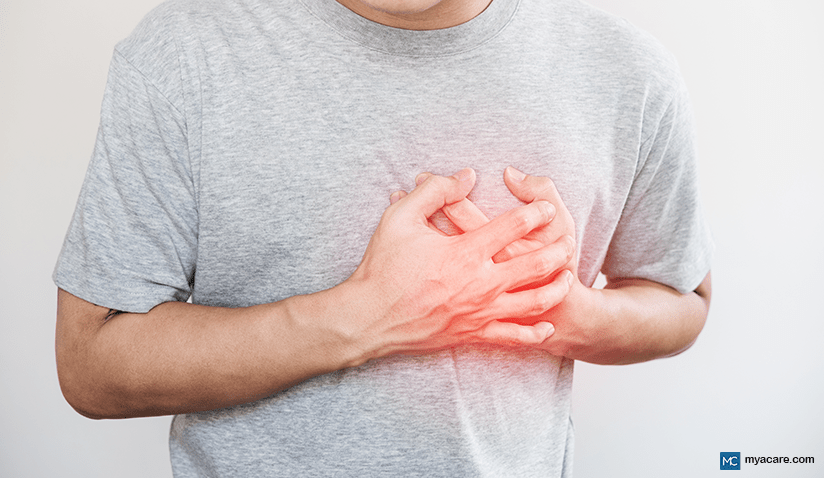WHAT IS MONONUCLEOSIS?

Mononucleosis (or just mono) is a systemic condition that develops after being infected with the Epstein Barr Virus (EBV). EBV is a common virus that’s widely spread among the human population, and it infects nearly everyone at a certain point in their life.
The majority of the people infected with the virus, though, don’t develop mononucleosis. The virus resides silently in their bodies for the rest of their life, without causing mono symptoms. Those who do develop mononucleosis complain of fatigue, widespread lymph node enlargement, joint pain, and other symptoms.
Mono is also called the kissing disease since it’s commonly spread among teenagers through kissing. EBV is usually shed in saliva, so kissing and sharing utensils or food can all transmit it.
Recovery from mono usually occurs spontaneously within a few weeks without the need for any specific treatments. Rest and hydration are of utmost importance.
Keep reading to learn more about kissing disease (mono), symptoms, risk factors, complications, treatment, and more!
Epstein Barr Virus (EBV)
Mono is usually a result of an Epstein Barr Virus (EBV) infection. The EBV belongs to a large family of viruses called herpes viruses, which includes well-known viruses like HSV-1 and HSV-2. This group of viruses typically infects humans at an early age and resides life-long dormant in the body of those infected.
In most cases, an EBV infection does not cause any symptoms. The virus remains dormant in your blood cells for the rest of your life.
According to the CDC, only 25% of college students who are infected with EBV go on to develop mononucleosis with symptoms. In the remaining 75%, the infection usually goes unnoticed.
Transmission
The reason why mononucleosis is called the kissing disease is that it’s commonly spread among college students and teenagers, probably as a result of kissing. The EBV virus is shed in our saliva, and hence kissing, sharing eating utensils, cups, bottles, and food might transmit the virus between individuals.
Although kissing is likely the most common way for mononucleosis to spread, the EBV virus is present in other bodily fluids as well, such as semen and blood. This means that the mono can be spread through sex and blood transfusions as well.
Symptoms
The symptoms of mononucleosis usually appear first 4 to 6 weeks after the initial infection with EBV. This is called the incubation period, during which the virus is silently replicating without causing symptoms.
The symptoms of kissing disease are usually mild, but they can be more intense in certain individuals. Possible symptoms of mononucleosis include:
- Fatigue
- Fever
- Throat pain
- Joint pain
- Enlarged lymph nodes all over the body (armpits, groin area, neck, and others)
- Enlarged liver and spleen (usually felt below the ribs)
- Skin rash
The symptoms of mononucleosis usually last for 2 to 4 weeks, and gradually resolve on their own. However, in some patients, the illness can be more severe and extend for several months before resolving.
Risk Factors
So, who gets mono?
People who are at high risk of exposure and those with suppressed immunity are more likely to develop mono after an EBV infection:
- People on immunosuppressive medications
- Teenagers and young adults
- College and high school students
- Nurses, caregivers, and other healthcare professionals
Complications
In most cases, mononucleosis ends after a steady recovery period without causing any dangerous problems. Nevertheless, some individuals might develop concerning symptoms of mono during the course of the disease:
- Spleen enlargement (splenomegaly): In some cases, the spleen might multiply in size and become palpable in your belly. A large spleen is at high risk of injury, rupture, and bleeding.
- Liver inflammation (hepatitis): An EBV infection and mononucleosis can lead to hepatitis and jaundice (yellow skin and eyes)
- Secondary infections: Since mononucleosis mainly affects immune cells, people who develop the illness might sometimes develop bacterial infections in the tonsils, lungs, sinuses, and others.
Diagnosis
The diagnosis of mononucleosis is usually done clinically without the need for further tests. Your doctor will take into consideration your age and risk factors, symptoms, and physical examination to establish his or her diagnosis.
The physical examination will involve palpation of different parts of your body to find enlarged lymph nodes and assess the size of your liver and spleen. Some tests might be ordered to confirm the diagnosis of mononucleosis:
- Routine blood test: Helps your doctor assess the severity of your illness
- Monospot test: A specific test to identify EBV infections through testing for heterophile antibodies
- EBV antibody test: A more specific test that identifies EBV infections by testing for specific EVB antibodies
Treatment
Like most viral infections, mononucleosis does not have a specific treatment. The aim is usually to ease symptoms and let the disease take its course without causing any complications.
Here’s a list of treatments, home remedies, and tips for a swift recovery from mono:
- Strict rest: If you have the kissing disease, you have to take some time off work and rest at home to let your body heal well. The fatigue that comes with mononucleosis will prevent you from staying active, so listen to your body and rest.
- Avoid sports: This is especially true if you have liver and spleen enlargement. Contact sports should be strictly avoided in such cases due to the high risk of spleen rupture, bleeding, and life-threatening outcomes. Make sure you consult with your doctor before returning to sports after a mono infection.
- Healthy diet: Make sure you eat your veggies, meats, soup, and beans to ensure your body is in top shape to fight off the infection. A healthy diet is essential during recovery from viral illnesses.
- Hydration: To keep your body working efficiently against the virus and speed up recovery, you need to drink enough water throughout your day (up to 2 Liters). The fever that’s caused by mononucleosis can dehydrate your body.
- Pain medications: Paracetamol and non-steroidal anti-inflammatory drugs (like ibuprofen) might be prescribed by your doctor to deal with any pains or fever.
Do not take antibiotics for mononucleosis. Antibiotics work against bacteria, and not against viruses like EBV. They might even cause a rash in some individuals with mono. Antibiotics might be prescribed only if you’ve developed a secondary bacterial infection on top of your mononucleosis.
Future Outlook
In most cases, a mononucleosis infection resolves without treatment within 4-6 weeks of symptoms onset. During this time, make sure to listen to your body and give it the rest it deserves for a speedy recovery. If you feel like you’re not improving or your symptoms are worsening, then you should consider consulting your physician.
To search for the best Ear Nose And Throat (ENT) healthcare providers in Germany, India, Malaysia, Spain, Thailand, Turkey, the UAE, the UK and the USA, please use the Mya Care search engine.
Sources
- https://www.cdc.gov/epstein-barr/hcp.html
- https://www.cdc.gov/epstein-barr/about-ebv.html
- https://www.cdc.gov/epstein-barr/about-mono.html
- https://www.ncbi.nlm.nih.gov/pmc/articles/PMC4670567/
- https://www.amboss.com/us/knowledge/Infectious_mononucleosis
- https://www.in.gov/isdh/23306.htm
Disclaimer: Please note that Mya Care does not provide medical advice, diagnosis, or treatment. The information provided is not intended to replace the care or advice of a qualified health care professional. The views expressed are personal views of the author and do not necessarily reflect the opinion of Mya Care. Always consult your doctor for all diagnoses, treatments, and cures for any diseases or conditions, as well as before changing your health care regimen. Do not reproduce, copy, reformat, publish, distribute, upload, post, transmit, transfer in any manner or sell any of the materials in this blog without prior written permission from myacare.com.



